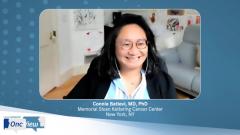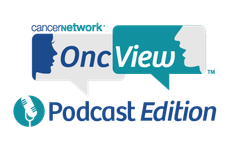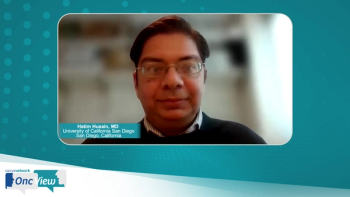
Sequencing Changes in R/R FL Therapies
Connie Batlevi, MD, PhD, discusses how the sequencing of follicular lymphoma therapies has changed in the past year and looks to the future with the upcoming American Society of Hematology (ASH) annual meeting.
Episodes in this series
Kristie L. Kahl: Given the COVID-19 pandemic and the addition of these newer therapies, how has your sequencing of therapy changed over the past year?
Connie Batlevi, MD, PhD: We know there is strong data regarding CD20-based maintenance therapy in terms of improving progression-free survival, but not overall survival. It remains a decision as to whether to utilize that maintenance or not. COVID-19 has impacted that in the sense that continuous CD20-based treatment effectively reduces the effectiveness of any vaccination. Typically, CD20 maintenance therapy lasts about 2 years. Maintenance therapy in this vein is a little challenging to recommend probably for all patients, but particularly in patients who achieve a complete remission [CR]. It becomes more of a discussion for patients that don’t achieve a CR or truly demonstrate that they need this kind of maintenance therapy, so we end up tailoring our maintenance therapy discussions even more. In terms of the availability of newer therapies, it truly depends on the goals of those individual patients. When we talk about some of these target therapies, it’s typically indefinite therapy, whereas regimens like R-CHOP [rituximab, cyclophosphamide, doxorubicin, vincristine, and prednisone] or r-bendamustine, they have a finite amount of time. But you are gaining other nonchemotherapy-related benefits, so we end up talking more about how we select each treatment as it relates to that person.
Kristie L. Kahl: What has been your experience with tazemetostat?
Connie Batlevi, MD, PhD: Tazemetostat is a drug that is very easy to give. It’s an 800-mg drug that patients take orally twice a day. It’s 200-mg pills, so it’s 4 pills twice a day. The adverse effect profiles are easy to manage. There is no substantial neutropenias, or leukopenias aren’t concerning, especially in this pandemic setting. In terms of what we use it for, in the approved setting, it’s primarily for patients in the relapse setting. If they have an EZH2 mutation, it makes a lot of sense to do it. It would mean that you have to test EZH2 mutation status. If they don’t have an EZH2 mutation, I’ve been using it in patients who tend to be a little more frail. By frail, I mean they can’t get any aggressive therapies. They are not truly eligible for autologous stem cell transplants, allogeneic stem cell transplants, or CAR T cell [chimeric antigen receptor T cells] type treatments.
Kristie L. Kahl: What are you looking forward to during this upcoming ASH [American Society of Hematology] annual meeting?
Connie Batlevi, MD, PhD: I’m looking forward to the immune therapy data in both large cell lymphoma and follicular lymphoma. CAR T cells and bispecifics are important for this patient population in the earlier lines of therapy, and in the patients who have a higher risk of disease. Both of the second-line data for CAR T cells in diffuse large B-cell lymphoma will be exciting material to monitor. Bispecifics specifically should have data in follicular lymphoma, and those are an exciting class of agents that is immune-based and may have a high impact in follicular lymphoma. I will also be presenting our data on the rituximab, lenalidomide, and tazemetostat combination for second-line follicular lymphoma.
Kristie L. Kahl: Great. Well, thank you so much.
Thank you all for watching this CancerNetwork® OncView™ program from MJH Life Sciences™, we hope you found this to be valuable to your clinical practice.
Transcript edited for clarity.
Newsletter
Stay up to date on recent advances in the multidisciplinary approach to cancer.






































